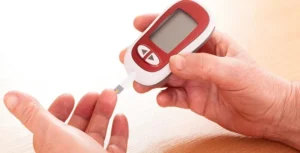How Are Hearing Loss and Diabetes Related?

Several studies have suggested that people with hearing loss may be at higher risk for other conditions. However, in the case of hearing loss and diabetes, the latter may increase one’s risk for the former instead of vice versa. Worse yet, the correlation between diabetes and hearing loss is substantially stronger than with other conditions. The good news is that diabetes doesn’t automatically mean hearing loss – learn more below.
How commonly do people with diabetes experience hearing loss?
Several studies have explored the frequency of hearing loss in people with diabetes and come to the following conclusions:
-
- In a 2003 study reported in the journal Otology & Neurotology, researchers found a strong correlation between diabetes and hearing loss. The study determined that people with diabetes were more likely to have hearing loss than people of similar ages without diabetes. The study surveyed electronic medical records of 12,575 people with diabetes and 53,461 people without diabetes collected between 1989 and 2003.
-
- According to a 2008 National Institutes of Health (NIH) study with 11,405 participants, adults with diabetes are twice as likely to have hearing loss as adults without diabetes. Additionally, the study found that, among 399 adults with diabetes, 54% experienced high-frequency hearing loss. Among a group of 4,741 adults without diabetes, only 32% experienced high-frequency hearing loss.
- A 2012 Journal of Clinical Endocrinology & Metabolism study came to similar conclusions. This study found that, across 13 studies that included over 20,000 participants, people with diabetes of all ages experienced hearing loss at greater rates than those without diabetes.
-
- The U.S. Centers for Disease Control and Prevention (CDC) has also observed a correlation between prediabetes and hearing loss. According to the CDC, people with prediabetes are 30% more likely to have hearing loss than people without prediabetes.
How can diabetes cause hearing loss?
Although the correlation between diabetes and hearing loss is clear, the exact biological pathways underlying the connection remain somewhat unclear. The leading theory is that diabetes’ effects on your blood vessels also affect your ears.
Namely, diabetes – especially in people who aren’t taking steps to control their blood sugar levels – damages small blood vessels. This damage can occur in the ear’s blood vessels and restrict blood flow. As a result, the ears can’t function as properly, and your hearing diminishes.
Notably, when diabetes damages small blood vessels in other organs, these organs can typically get blood from elsewhere. However, since the ears have no alternative blood sources, diabetes-related blood vessel damage has a far stronger impact.
This explanation requires further study, but it’s plausible to many in the medical field. Another potential explanation is that the nerve damage common with diabetes may occur in the auditory nerve, which carries sound from the inner ear to your brain. This nerve damage can thus lead to hearing loss. However, more research is needed before scientists and audiologists fully accept either theory.
How to prevent hearing loss if you have diabetes
If you have diabetes, preventing hearing loss starts with typical hearing protection best practices and extends to methods unique to those with diabetes. Ways for people with diabetes to prevent hearing loss that people with other conditions need not follow include:
- Control your blood sugar. When your blood sugar levels fall within normal ranges, damage to your small blood vessels is far less likely. In turn, your hearing should remain intact.
- Avoid smoking. Cigarette use has long been correlated with worse cases of diabetes. It can also contribute to hearing loss. Both your current blood sugar levels and your long-term hearing improve when you stop smoking.
- Exercise regularly. Diabetes experts have long advised that people with diabetes exercise regularly – daily if possible – to maximize blood flow and circulation. Better blood flow and circulation can decrease the potential for small blood vessel damage and thus hearing loss.
- Eat healthy. Many medical authorities say that healthy diets can help manage factors that may contribute to risk for diabetes.
How to address diabetes-related hearing loss
If you’re worried that your diabetes has affected your hearing, contact an audiologist to book a hearing test. These non-invasive, painless exams are simple and quick. You’ll listen to sounds or speech, and you’ll respond to what you hear as your audiologist instructs. An audiogram will display your real-time results, and you and your audiologist will discuss the extent of your hearing loss.
Chances are your audiologist will suggest hearing aids to make up for your lost hearing. With hearing aids, you can bridge the gap between full and diminished hearing better than with any other method. Plus, when you choose I Love Hearing for your hearing exam, both audiologists and hearing aid specialists are involved in your care. Together, our team boasts combined decades of experience pairing all kinds of people with the devices perfect for them.
Contact I Love Hearing about diabetes-related hearing loss
When diabetes affects your hearing, you need help from experts who can assess the extent of your hearing loss and immediately find you solutions. This description is I Love Hearing to a tee. Visit any of our four Long Island locations to start treating your hearing loss and preventing further hearing decline. We’re happy to perform hearing exams and suggest hearing aids for anyone of any age.
That’s not all: At I Love Hearing, if someone comes with you to your hearing exam, we’ll test that person’s hearing free of charge! When you choose I Love Hearing, you protect your hearing and the hearing of your loved ones. Contact I Love Hearing now to minimize the impact of diabetes on your hearing and enjoy the sounds of life again.

